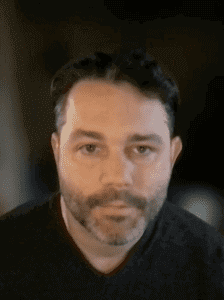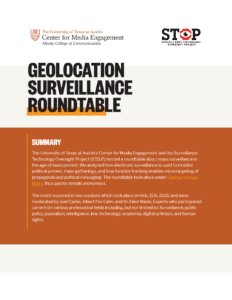UNDERSTANDING GEOLOCATION


On Feb. 11, 2021, The University of Texas at Austin’s Center for Media Engagement and the Surveillance Technology Oversight Project (S.T.O.P.) hosted a roundtable about mass surveillance in the age of mass protest. Below, we include quotes and explainer videos from our panel of experts on what geolocation data is, how it’s captured, and why it matters.* The full conference report is available below.
Our data is collected in ways that create disparate impacts and track all our movements.
The fact that these facial recognition technologies and surveillance technologies are becoming normalized and integrated into society is most concerning because they become no longer shocking.
Explainer Videos

GEOLOCATION BASICS
Justin Hendrix from Tech Policy Press helps you understand geolocation and how it’s used to target you.

GEOFENCE SEARCH WARRANTS
Jennifer Granick from the ACLU helps you understand geofence search warrants and how they allow police to track people.

SURVEILLANCE & DATA COLLECTION
Cory Doctorow, author and futurist, helps you understand how public and private actors work together to surveil you.

GEOLOCATION & LEGISLATION
Jake Lapperuque from The Constitution Project explains the likelihood of geolocation regulation at the federal level.
*This multidisciplinary discussion took place under Chatham House Rules, so quotes remain anonymous. Experts who participated come from various professional fields including, but not limited to: Surveillance, public policy, journalism, intelligence, law, technology, academia, digital activism, and human rights.




